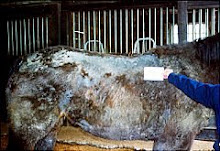
Ginny Powell of the Palm Beach Equine Clinic administered care to a dying horse on Sunday.
by Karen Crouse, NYTimes
April 21, 2009
WELLINGTON, Fla. — The Lechuza Caracas farm is set off from the road by a giant hedge, and through bare patches, one could see at least 10 horses, their tails flicking as they grazed in a field, in a tableau of normalcy that no longer exists.
On Monday, the deaths of 21 polo horses from Lechuza Caracas, a Venezuelan-based team, were being mourned. The team was preparing to compete in a quarterfinal match of the United States Open Polo Championship on Sunday when a few of its horses collapsed at the International Polo Club Palm Beach. As they were being tended to, several other horses became disoriented and collapsed in a dominolike chain.
By Sunday night, 15 horses were dead. Six others died overnight. In a few frantic hours, Lechuza Caracas’s most treasured performers had been lost. In the world of polo, the riders are considered less valuable. Some horses belonged to the owner of Lechuza Caracas, the Venezuelan multimillionaire Victor Vargas, and some were owned by the team’s individual riders.
Peter Rizzo, the executive director of the United States Polo Association, said that his organization opened an investigation Monday as state agriculture scientists in Kissimmee began performing necropsies on eight carcasses.
“We’re still reeling from this,” Rizzo said in a telephone interview. “I cannot even process the horror from yesterday.”
He added that veterinarians who treated the animals said they believed the blame lies with a toxin that all the horses consumed. An examination of the tissues, organs and blood of the dead animals should reveal whether the toxins were ingested or injected.
The veterinarian Paul Wollenman of the Palm Beach Equine Clinic, said in a statement, “We do know that based on overwhelming clinical evidence, this event was isolated to the Lechuza barn horses and the initial evidence shows no infectious element.”
At the Lechuza Caracas horse farm here, a makeshift memorial composed of bouquets of roses and perennials took shape at the foot of the keypad outside the front gates. Rizzo, who has been in contact with Vargas, said, “He definitely is in shock and mourning.”
The Lechuza Polo team said in a statement: “For the last three decades, Lechuza Polo has participated in polo championships and tournaments all around the globe. In that time, we have not encountered such a dire situation like this as our horses receive the most professional and dedicated care possible.”
Spectators at the competition described a surreal scene: blue tarps popped up on the field as team officials tended to fallen horses, and veterinarians raced from the stands to form a triage unit to help the wobbly animals. Each of the horses was 10 or 11 years old and worth about $100,000.
“I’ve been playing polo for 20 years and I’ve never seen anything like it,” said Nacho Figueras, a rider for Black Watch, the team that was to oppose Lechuza Caracas. “The horses started collapsing. It was really a bad scene. Me and the other riders went and helped all the grooms. There were 20 vets on site and they were all trying to help.”
The horses began becoming ill 45 minutes before the scheduled start of the match. Several minutes later, officials announced that the match had been canceled and an exhibition match featuring the Black Watch team would be held instead.
The Lechuza Caracas team withdrew from the competition. The other players and club representatives have opted to continue with the event as a way of honoring the Lechuza horses. The semifinals will be held, as scheduled, on Wednesday.
John Wash, the president of club operations at International Polo, said in a statement, “We continue to stay in contact with everyone touched by this event and share in their grief.”
http://www.nytimes.com/2009/04/21/sports/othersports/21polo.html?_r=1&hp

















No comments:
Post a Comment